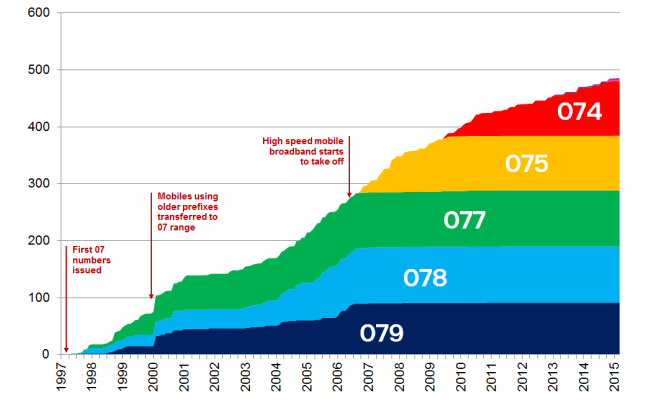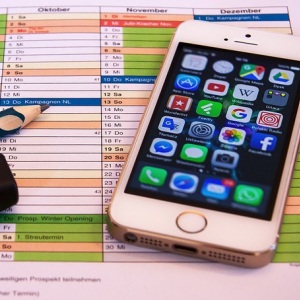07 numbers
Mobile, pager and personal numbers
UK telephone numbers beginning '07' are used for mobile devices and for personal numbering. Also once known collectively as the 'find me anywhere' range of numbers, they are often more expensive to call than fixed, landline numbers beginning 01, 02 or 03.
070 - personal numbers
These are numbers allocated to an individual or business, who can use them to redirect incoming calls to any phone they wish, as and when they choose.
As an example, an individual could configure their 070 number to forward calls to their work phone in the daytime, but connect to their home phone in the evening. They can also be used to sequentially 'hunt' for an individual by ringing different phones in sequence or simultaneously.
071 to 079 - mobile devices
Numbers beginning 071, 072, 073, 074, 075, 07624, 077, 078 or 079 are for mobile phones in the UK, Channel Islands or Isle of Man. All other numbers beginning with 076 are reserved for pagers.
The first five or six digits of a number are normally enough to show which company first issued the number. However, as customers can retain their number when moving between phone companies, it is not a reliable indicator of which provider they currently use.
» Current mobile phone and pager numbers
Charges for calling mobile phones
Calls to UK mobile phones are often included in call allowances or bundled talktime. If you do not get inclusive calls to mobiles, have used up your allowance, or are calling at a time of day when you do not get free calls, your phone company will charge you a standard per-minute rate.
Calls from the UK to mobile phones in Guernsey, Jersey and the Isle of Man are often charged at a higher rate than calls within the UK, despite using very similar numbers.
Additionally, higher rates may be charged on calls to certain smaller networks or specialised services. If calling an unfamiliar number for the first time, it is advisable to confirm the cost directly with your phone company before calling.
History of 07 numbers
Introduction of mobile numbers
As modern mobile phones slowly came into limited mainstream use during the late 1980s and early 1990s, they were issued with ten-digit numbers across a variety of different prefixes. The UK's telephone numbering system had been planned almost exclusively around landline use, requiring mobiles and other new services to be slotted in to whatever spare capacity remained. In practice this meant using a mixture of spare or reclaimed prefixes that were indistinguishable from landline area codes.
An example of some prefixes in use in 1994 shows how landlines and mobiles were jumbled up together:
| Area code | Used for | Replaced by |
|---|---|---|
| 0370 | Vodafone mobiles | 07770, from 2001 |
| 0371 | Landlines in Great Dunmow, Essex | 01371, from 1995 |
| 0372 | Landlines in Esher, Surrey | 01372, from 1995 |
| 0373 | Landlines in Frome, Somerset | 01372, from 1995 |
| 0374 | Vodafone mobiles | 07774, from 2001 |
| 0375 | Landlines in Grays, Essex | 01375, from 1995 |
Changeover to 07 numbers
In 1995, the nationwide 'Phoneday' renumbering changed all landline area codes to start with '01' and started a national transition from ten- to eleven-digit phone numbers. There was no immediate change to mobile phone numbers, but millions of spare numbers starting with digits 02 to 09 were created for future use.
From 1997, the first batches of modern-style 11-digit mobile phone numbers starting with 07 began to be issued to all new customers.
Remaining older mobile numbers not starting with 07 were finally withdrawn in April 2001, after customers were transferred to equivalent new-style numbers. From this point, all standard mobile phones in the UK, Channel Islands and Isle of Man had eleven-digit numbers starting with 07.
Surging mobile number demand
Initial plans saw just 30% of 07 numbers reserved for mobile phones. Other 07 numbers were intended for use by pagers and a new type of flexible personal numbering with mobiles restricted to numbers starting 077, 078 and 079.
While this allowed for 300 million usable mobile numbers, the number of mobile phones, mobile internet and related services coming into use led to continuing high demand for mobile phone numbers. By late 2006, the original range of numbers was almost exhausted.
With the neighbouring 076 range reserved mainly for pagers, regulator Ofcom has started releasing other blocks of mobile numbers:
- 075 numbers came into use in 2006
- 074 numbers came into use in 2009
- 073 numbers came into use in 2014
Additionally, a limited quantity of out-of-sequence numbers starting 071 were issued during early 2013 to O2 for unknown reasons.

Above: allocations of mobile numbers to mobile phone networks, 1997 to 2014.
Current and future trends
After a period of high growth, demand for new mobile numbers has now dropped to a much lower level.
During 2018, none of the major networks requested an additional supply of numbers. The year saw just 200,000 new numbers allocated in total in the UK, to allow one new small supplier to enter the market.
Numbers starting 072 and 071 are likely to come into mainstream use in due course, but this is now likely to be some years away.
Should demand ever exceed what can be accommodated in these number ranges, there are one billion numbers starting 06 which are currently unused and could easily be issued for mobile services alongside the existing 07 numbers.
Number formatting
There is no set format for UK mobile phone, pager and personal numbers, but the commonest format used by telephone companies is: 07xxx xxxxxx
For international callers, use: +44 7xxx xxxxxx
